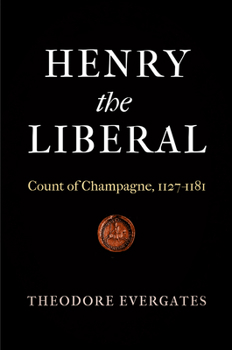Henry the Liberal: Count of Champagne, 1127-1181
Over the course of the twelfth century, the county of Champagne grew into one of the wealthiest and most important of French principalities, home to a large and established aristocracy, the site of international trade fairs, and a center for artistic, literary, and intellectual production. It had not always been this way, notes Theodore Evergates, who charts the ascent of Champagne under the rule of Count Henry the Liberal.
Tutored in the liberal arts and mentored in the practice of lordship from an early age, Henry commanded the barons and knights of Champagne on the Second Crusade at twenty and succeeded as count of Champagne at twenty-five. Over the next three decades Henry immersed himself in the details of governance, most often in his newly built capital in Troyes, where he resolved disputes, confirmed nonlitigious transactions, and monitored the disposition of his fiefs. He was a powerful presence beyond the county as well, serving in King Louis VII's military ventures and on diplomatic missions to the papacy and the monarchs of England and Germany. Evergates presents a chronicle of the transformation of the lands east of Paris as well as a biography of one of the most engaging princes of twelfth-century France. Count Henry was celebrated for balancing the arts of governance with learning and for his generosity and inquisitive mind, but his enduring achievement, Evergates makes clear, was to transform the county of Champagne into a dynamic principality within the emerging French state.Format:Hardcover
Language:English
ISBN:0812247906
ISBN13:9780812247909
Release Date:February 2016
Publisher:University of Pennsylvania Press
Length:320 Pages
Weight:1.45 lbs.
Dimensions:1.3" x 6.3" x 9.1"
Customer Reviews
0 rating





